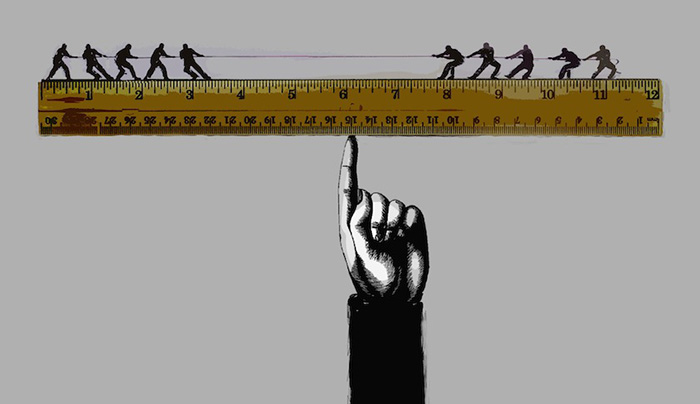我的生活我做主,如何对待嫉妒与竞争

|
我最近参加了一次会议,在会场碰见一位女士,我们只是点头之交,多年未曾联系。当时,她坐在桌前给自己的新书样本签名,面前是蜿蜒的长队,从展位边一直排到会议中心深处。 在这周偶遇以前,我还曾毫无来由地想起过这位女士。“她写的那本小说不知道怎样了?”我当时好奇地想。是取消出版了?还是没写完?我想说,这些纯属莫须有的猜测,只是我自作多情的猜想,没有任何根据。 我猜想她的书或许会出版失败。这种可能性让我潜意识里感到开心,不过我不愿承认。众多粉丝围绕她签名的一幕虽然在我心中萦绕数小时挥之不去,但其实我对此人并没有怨恨不满。 竞争意识可能激起我们内心反复自省。见到别人事业腾飞,我们就会自问,有什么致命缺陷阻碍自己取得别人那样辉煌的成绩?是天资不够,还是更严重的问题——我们太懒、太害羞,还是总踩错点所以抓不住机遇成就大事。 我先是自责在社交网站推特(Twitter)上发帖太少,然后又怪自己没认真管理推特账号,往往得出的结论是应该更努力工作。所以,一旦自怨自艾阶段结束,和更成功的人比较一般会激励自己上进。(比如这次,由于隐隐怀疑跟那位女士相比我太失败了,这才会全神贯注写这篇专栏。) 可如果要依赖小小的嫉妒心让自己保持优势,显然不是长久之计,甚至根本就算不上一种策略。通常改变自己看待世界的角度,甚至对自己讲些激励性的豪言壮语,其效果会更好。 为什么我会希望那位相识的女士出书失败,经济萧条时期推出励志书籍的作者早有解释。拿破仑·希尔创作了1937年的畅销书《思考致富》(Think and Grow Rich)。他若在世,应该会批评我形成了一种“稀缺心态”。这种心态是指,认为我们身边的爱、金钱和认同是有限的,其他任何人的成功都意味着,留给我的这些资源会变得更少。与“稀缺心态”形成鲜明对比的是“富足心态”,即认为资源非常充裕,人人都能得偿所愿。希尔认为,成功人士通常拥有“富足心态”。 相信理论上的富足普遍存在,确实有助于克服嫉妒心,但如今保持这种心态颇有难度。因为我们生活的时代有远比过去丰富的渠道,来获悉别人的各种进展。这是当今社会文化的阴暗面,在这种氛围中,人们频繁地更新着自己的状态。在希尔那个年代,想了解竞争对手怎样行事,人们必须亲自出门打探,得走访城镇跟人直接交谈。那时的人当然不会像现在这样,独自坐在桌前上网就能了解对手的动态,其间还得时不时看到中学好友的晒娃照。即使有人怀着坚定的富足心态,面对可以随时用谷歌搜到的各类信息——别人最近怎样、最近去了哪、有多少粉丝点赞,也必定会产生某种焦虑。雅各布·西尔弗曼在新书《服务条款:社交媒体与持续互联的代价》(Terms of Service: Social Media and the Price of Constant Connection)中把这些信息称为“持续可见指标”。 有趣的是,我发现,内向的人比外向的人更有可能在社交媒体上产生挫败感。有研究显示,对于高敏感的人群,没有隔间的开放式办公室会影响他们最佳工作状态的发挥。心理治疗师内奥米·沙拉盖指出,没有隔墙的“保护”这类人将不得不为自己划定“心里边界”来控制分心和干扰。而对周围环境不敏感的人在此类环境里会表现得更好。人们还未意识到这也是少数职场优势之一。 归根结底,同自己比较才是唯一有益的做法。我花了几天时间,终于不再为那位熟人的粉丝长队伤神。但期间我很努力地集中精力让自己不去介意,或者更重要的是不去比较。诺曼·文森特·皮尔1952年出过一本书,名为《积极思维的力量》(The Power of Positive Thinking)。虽然此书的建议值得商榷,但也有先驱之举:肯定了今天人们说的“专注力”。皮尔在书中写道:“我建议一天至少两次脑子里什么都不想,如有必要可以多几次。清空大脑中的恐惧、怨恨、不安、追悔和愧疚。只要你有意识地努力放空大脑,情绪往往就会舒缓。” 皮尔认为,每个人每天都应该留出至少15分钟保持绝对平静。皮尔应对竞争的策略可能会让有些人觉得古怪。他建议养成为别人祈祷的习惯,而且要反复祈祷,毫无偏见。不论是街头擦肩而过的陌生人,还是透过火车车窗看到静立于庭院中的女士,都要祈祷。祝愿他们身体健康、生活富足,一天比一天过得好。 这样,你可以专心的完成一些实实在在的工作,而不是被负能量所束缚。到了一定时候,你很可能不再那么关心别人的举动,因为你的成就已经足够令人嫉妒。 这位女士的书已经问世。现在,我希望她的书成为畅销书。因为一旦成真,我会想没准我对新书大卖亦有贡献呢,这种猜测同样毫无根据,但却绝非尖酸挖苦。(财富中文网) 译者:Pessy 审校:夏林 |
I recently attended a conference where I saw a woman I know slightly but haven’t spoken to in years. She was sitting at a table signing advance copies of her new book as a long line snaked around the edge of the booth to the depths of the convention center. This woman had come to mind apropos of nothing the week before. “Where was that novel she was working on?” I wondered. Was the publication cancelled? Was she not able to finish it? These speculations were totally groundless, I should add, based on nothing but my overactive imagination. The possibility that she had failed pleased me more than I’d care to admit. I have no grievance against this person whatsoever. Nonetheless the sight of her many fans haunted me for hours. Competitive feelings can spark intense rounds of self-reflection. We see someone whose career is taking off and then ask ourselves what fatal flaw prevents us from generating the dazzling output they do. Either we’re not talented enough, or, worse, we are too lazy, shy, or contrarian to capitalize on it. After beating myself up for not Tweeting enough, then for not really caring about Twitter, I usually come to the conclusion I need to work harder. So, once I stop moping, comparing myself to more successful people revs me up. (Only the creeping suspicion that I was a loser compared to this woman, for instance, got me to focus on finishing this column.) But relying on petty jealousy to get your priorities in order is not a strategy that works long term—or even a strategy at all. It’s often better to change your perspective on the universe, even going so far as to tell yourself useful lies. Depression-era self-help writers had a ready explanation for my hope that my acquaintance’s book was canceled. Napoleon Hill, author of the 1937 bestseller Think and Grow Rich, would have accused me of nursing a scarcity mindset—a notion that there’s only so much love, money, and recognition to go around, so any person’s success means there will be less left over for me. Hill contrasted that view with an abundance mindset, which contends that there’s more than enough for everyone to have everything they want. Successful people, he argued, had an abundance mindset. Believing in some abstract universal abundance can help quell jealousy, but living it out is a tremendous challenge at a time when we have vastly more access to information about how other people are faring. This is the darker side of a culture of incessant status updates. In Hill’s time, you had to go out of your way to learn how a competitor was doing. You had to walk around town and conduct in-person conversations. You certainly wouldn’t be gathering this intel at your desk, alone, between looking at high-school friends’ baby pictures. Even a person with a robust abundance mindset is bound to have some anxiety over all of the readily Google-able data about how people are doing, where they’re doing it, and how many followers applaud them for it—these “constantly visible metrics,” as Jacob Silverman puts it in his new book, Terms of Service: Social Media and the Price of Constant Connection. Anecdotally, I have found that introverts are more likely to feel defeated by social media than extroverts are. And studies have shown that open-plan offices make it harder for highly sensitive people to do their best work. Without walls, they have to manage distractions, interruptions, and “psychological boundaries” instead, says psychotherapist Naomi Shragai. People who are oblivious to their surroundings function better in such environments. It’s one of the few career benefits of being unaware. Ultimately, the only reliably useful competition is with oneself. I stopped being bothered by my acquaintance’s long line of fans within a few days, but it took concentrated attempts at not minding—or, more importantly, not comparing. “I recommend a mind-emptying at least twice a day, more often if necessary,” Norman Vincent Peale wrote in his 1952 The Power of Positive Thinking, a book of questionable advice that nonetheless contains this early nod to what is today called mindfulness. “Definitely practice emptying your mind of fears, hates, insecurities, regrets, and guilt feelings. The mere fact that you consciously make this effort to empty your mind tends to give relief.” Everyone should insist on no fewer than 15 minutes of absolute quiet every 24 hours, Peale claimed. Peale’s strategy for handling competition then takes a turn that may strike some as odd. He recommended that people develop a practice of praying for others, repeatedly and indiscriminately—a stranger you passed on the street, a woman in her backyard whom you glimpsed briefly out the window of your train car. Wish them health, prosperity, and a better tomorrow. The point is to free yourself of negative comparing energy so you can get some actual work done, at which point, you probably won’t care so much about what other people are doing. You’ll be in the zone. Now I wish for this woman’s book to become a bestseller, so when it does, I can enjoy the equally groundless, but non-bitter, speculation that I contributed to its success. It on sale already. |













